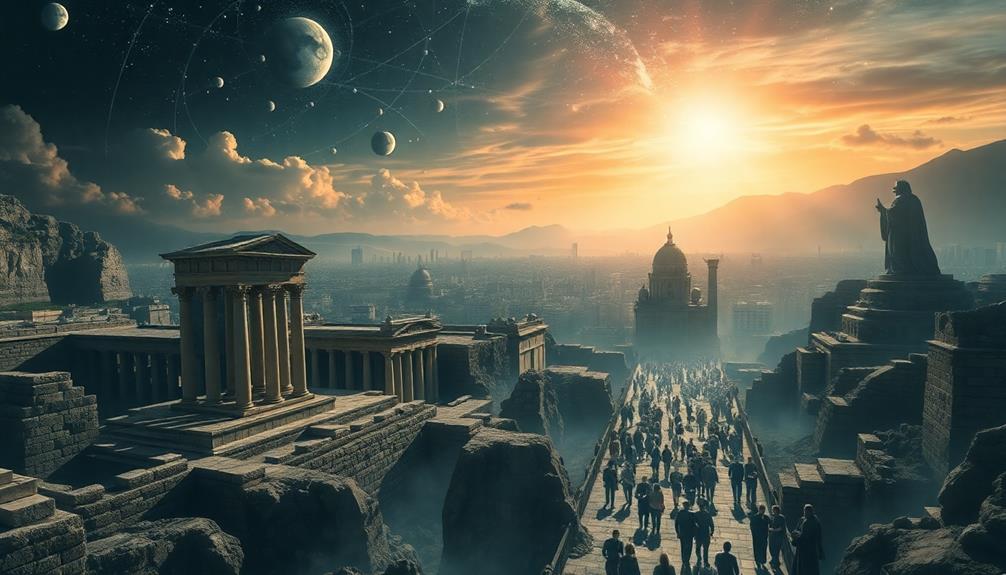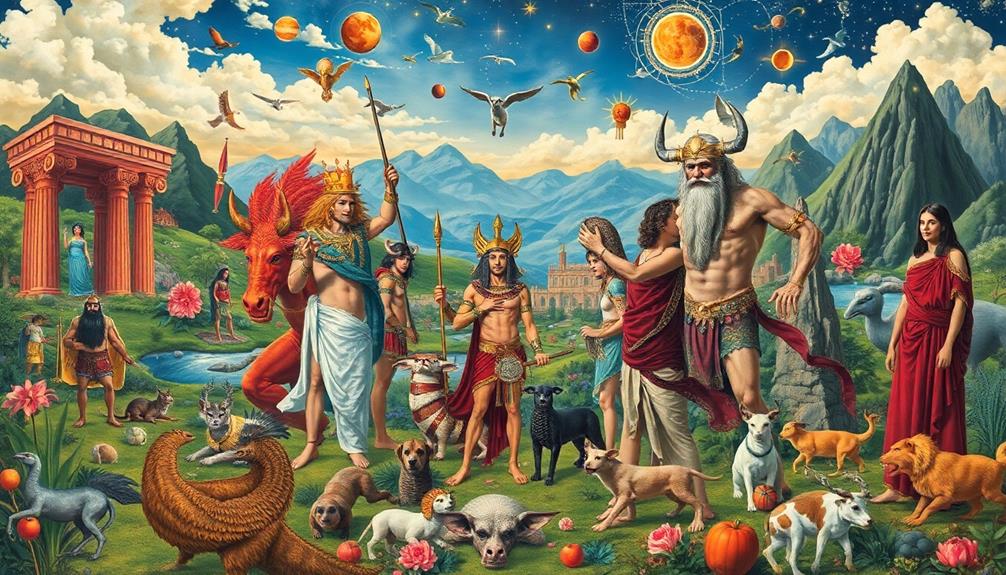You live within a tapestry of myths that shape your identity and how you perceive the world. These narratives offer explanations for existence, origins, and culture. Philosophically, it raises questions about free will and purpose—are you the author of your story or just a character in someone else's? Myths resonate deeply, connecting you to universal themes that reflect shared human experiences. They evolve with society, adapting to modern dilemmas and creating new narratives. Exploring this idea opens up discussions about identity, making you ponder your role in this ongoing story. There's much more to uncover in this fascinating debate.
Key Takeaways
- Myths provide frameworks for understanding identity and existence, suggesting we might all play roles in a larger narrative.
- The concept of archetypes in myths reflects universal human experiences, implying that individuals can embody these timeless characters.
- Philosophical debates on existence question whether life is a scripted narrative, akin to characters in a mythological tale.
- Modern myths in popular culture often mirror personal journeys, reinforcing the idea that individuals navigate their own mythic stories.
- Engaging with myths fosters empathy and connection, highlighting the shared human experience while questioning our roles within these narratives.
The Essence of Myths
Exploring the essence of myths reveals their profound role in shaping cultural identity and understanding. Myths serve as symbolic narratives that reflect how you and your community view yourselves, providing explanations for both natural and cultural phenomena. Creation myths, for instance, demonstrate humanity's quest to comprehend its origins and purpose, much like explorers who set out on journeys to discover new horizons and insights into existence the thrill of adventure. They address existential questions, helping you navigate the complexities of life and death.
Throughout history, myths have evolved from oral traditions to documented narratives, becoming integral in transmitting knowledge and cultural values across generations. The themes of creation, death, and the afterlife recur in myths, revealing a universal human struggle to make sense of existence and cope with mortality's fear.
Scholarly debate often surrounds the interpretations of these myths, especially as modern adaptations reflect contemporary values and societal norms. Yet, despite these shifts, the psychological essence of myths remains significant, tapping into the collective unconscious and resonating through archetypes that facilitate personal growth.
Historical Context of Myth-Making
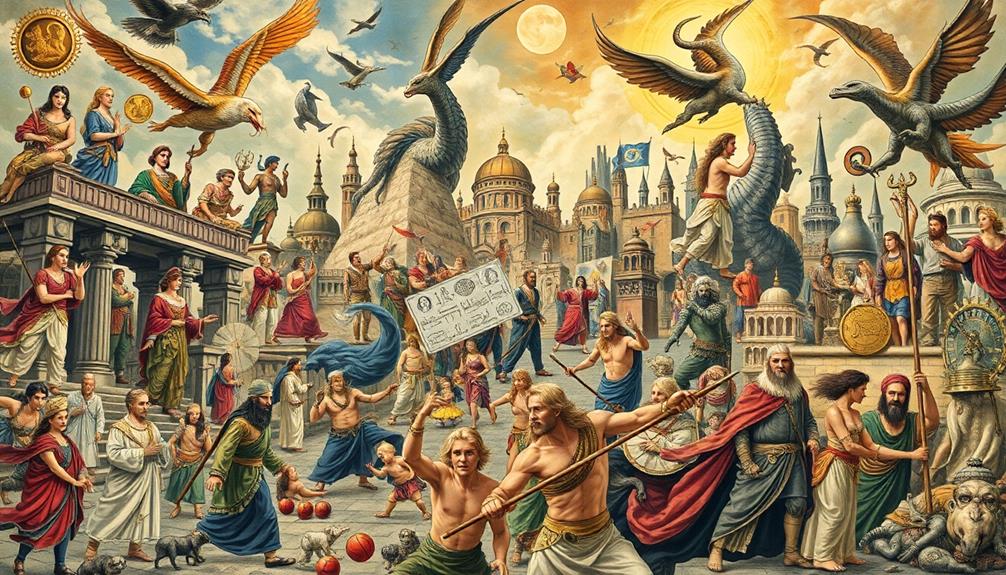
Myths have always been more than simple stories; they're foundational narratives that frame human existence within various historical contexts. Throughout history, societies created myths to explain the creation of the world and natural phenomena, shaping their cultural customs. Initially, early anthropologists saw these myths as sacred and tied to religion. However, modern scholars highlight their relevance in addressing societal norms and existential questions.
The change from oral traditions to documented narratives marked a significant evolution in myth-making. This shift allowed myths to be preserved and reinterpreted across generations, ensuring their survival. Over time, historical figures like Jesus and Muhammad became enveloped in mythologized narratives, showcasing how myths can evolve from historical truths into modified tales.
Here's a quick overview of the historical context of myth-making:
| Aspect | Ancient Myths | Modern Interpretation |
|---|---|---|
| Creation of World | Explains origins | Reflects societal issues |
| Cultural Role | Defines customs | Addresses existential queries |
| Evolution | Oral to written | Adaptation in popular culture |
Through this lens, you can appreciate how myths continuously shape and reflect human experience.
Modern Myths in Popular Culture
Today's popular culture is a fertile ground for the emergence of modern myths, where narratives crafted through films, literature, and digital media capture the essence of contemporary societal values and challenges. You see this in the Marvel Cinematic Universe, which spins a modern mythos around superheroes, blending archetypal themes of heroism and sacrifice with current discussions on identity and morality.
In relationships, the dynamics of love and heartbreak often echo these mythological themes, as individuals navigate the complexities of connection and emotion, such as the importance of clear communication during a breakup the classy way to explain a breakup.
Popular culture also reinterprets ancient myths, as in adaptations like "Percy Jackson" and "The Hunger Games," weaving timeless themes of struggle and resilience into fresh storytelling frameworks.
Video games such as "The Legend of Zelda" and "God of War" incorporate mythological elements, allowing you to engage with and reinterpret classic narratives in interactive ways.
Moreover, the rise of social media platforms has accelerated the spread of modern myths, creating new cultural narratives that often mix fact and fiction. This shapes public perception and collective beliefs, illustrating how deeply modern myths are embedded in our daily lives.
Philosophical Implications of Myth
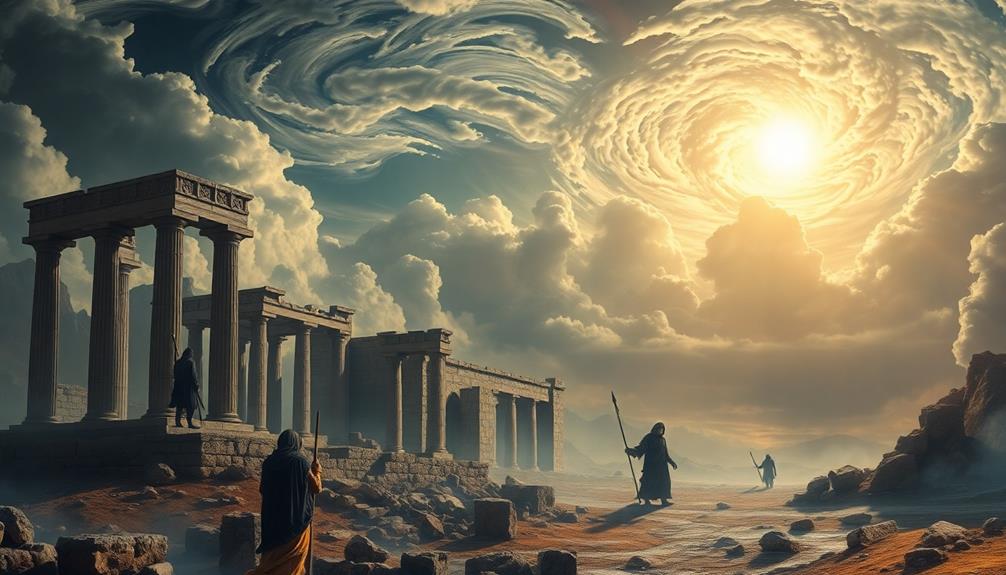
Myths shape how you view your reality, offering a framework to explore your identity and existence. They raise essential questions about who you're and how you fit into the larger story of life.
Myth as Reality Framework
A framework for understanding reality often emerges through the stories we tell, and myths play an essential role in this process. They address existential questions and reflect the collective beliefs that shape our moral compass.
By tapping into the collective unconscious, as Jung suggests, myths offer a way for you to connect with universal experiences that resonate across cultures. Just as individuals with borderline personality disorder may seek meaning through emotional narratives, myths can also help us navigate the complexities of human experience.
Here are some key aspects of myths as a reality framework:
- Existential Guidance: Myths provide insights into human existence and moral actions.
- Cultural Reflection: They adapt over time to address contemporary societal issues while maintaining core themes.
- Symbolic Narratives: Myths offer stories that navigate life's complexities, helping you understand your place in the universe.
- Universal Archetypes: They connect you to shared human experiences, fostering empathy and understanding.
- Behavioral Influence: Myths can guide individual and societal behavior based on the values they embody.
Identity and Existence Exploration
Exploration of identity and existence often leads you to the narratives embedded in myths, which serve as mirrors reflecting collective beliefs and values. In ancient times, myths were fundamental for understanding who you're and your place in the world. They offered frameworks for grappling with complex questions of purpose and morality, shaping societal norms and personal identities.
Furthermore, just as relationships evolve and require nurturing, so too does our understanding of identity—this is significant in fostering relationships that deepen bonds. Philosophers argue that these narratives provide deeper insights into human existence, addressing the existential dilemmas modern rationality often overlooks.
When you investigate the psychological aspects of myths, as proposed by Jungian theory, you discover how archetypes influence both personal identity and collective consciousness. These ancient stories continue to resonate today, suggesting that the narratives you construct about yourself are essential to understanding your identity in a contemporary context.
Myths and Human Identity
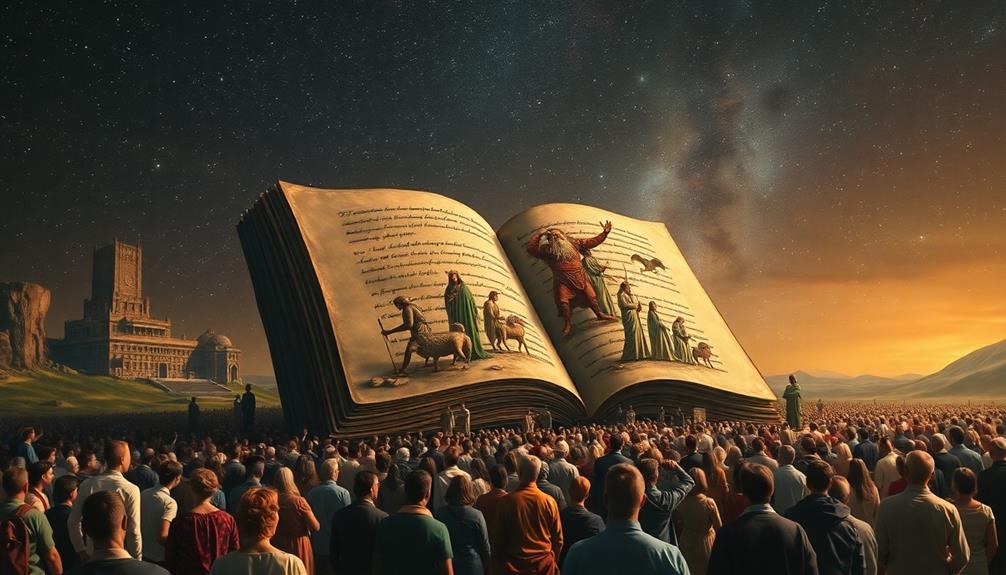
Countless cultures rely on foundational narratives to shape their identities, revealing how deeply intertwined myths are with our understanding of self. Myths don't just entertain; they reflect existential themes that resonate universally, influencing your perception of human identity. Understanding these cultural narratives can enhance your cultural intelligence, allowing you to navigate diverse perspectives more effectively.
Consider how myths impact you and those around you:
- Cultural Frameworks: Myths provide contexts for self-image and collective beliefs.
- Shared Experiences: Archetypes, like the hero's journey, illustrate common human values.
- Existential Reflection: They explore themes of creation, mortality, and what it means to be human.
- Adaptability: Myths evolve, mirroring societal changes and maintaining relevance.
- Personal Constructs: Your identity is shaped by the narratives prevalent in your culture.
These elements show that your human identity isn't just a personal endeavor; it's a reflection of larger narratives. By engaging with myths, you can better understand the roles you play in your own life and society.
As you navigate your identity, remember that these stories are more than mere tales—they're foundational to who you're and how you connect with the world.
The Future of Mythical Narratives
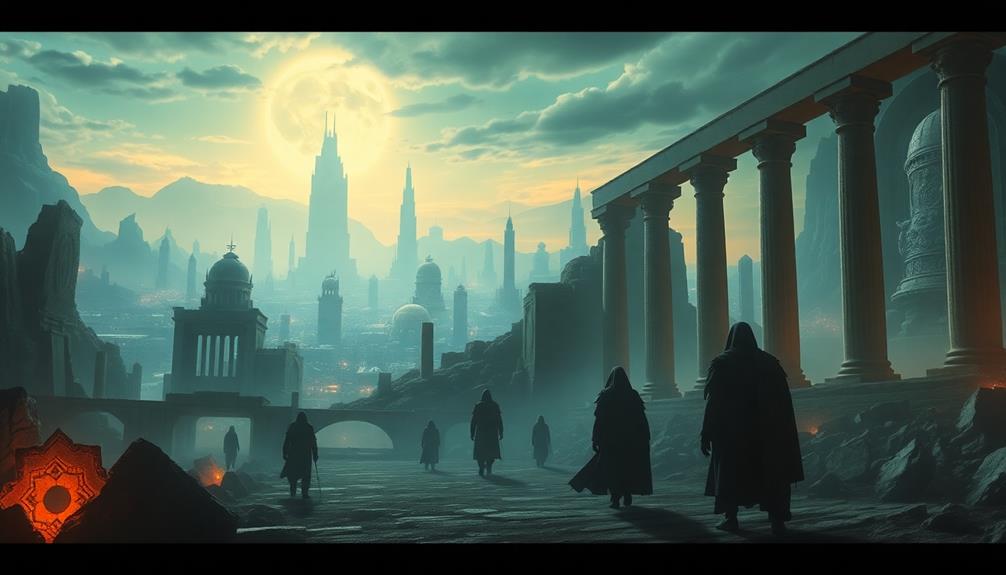
You've likely noticed how modern myths adapt to reflect today's cultural landscape, showing their relevance in films and literature.
For instance, contemporary artists often draw inspiration from literary themes, exploring identity and social issues through their work, which reflects the ongoing dialogue between tradition and modernity in the arts, as seen in the influence of literature on Bengali visual arts.
As society changes, these narratives evolve, offering fresh insights into our identities and challenges.
Let's explore how these adaptations shape our understanding of the human experience in a rapidly changing world.
Modern Myth Adaptation
As society evolves, modern myth adaptation emerges as a powerful reflection of contemporary values and concerns. You'll notice how ancient myths are reinterpreted in films and literature, resonating with today's audience.
These adaptations reveal the adaptability of myth-making, addressing existential themes and cultural anxieties, much like the evolution of personal artistic style that reflects changing societal contexts.
Consider these key aspects of modern myth adaptation:
- Reimagined Narratives: Old myths take on new forms, exploring current societal issues.
- Archetypal Characters: Familiar story arcs echo traditional myths, tapping into universal human experiences.
- Blending Genres: Popular media mixes various genres, creating fresh myths that resonate deeply.
- Digital Participation: Social media platforms allow everyone to contribute to myth-making, reflecting the collective psyche.
- Cultural Unification: Evolving myths foster community bonds, reinforcing shared identity and values.
Through these adaptations, you can see how narratives continue to shape our understanding of the world.
The ongoing evolution of myth in contemporary culture proves that it's not just relevant; it's essential for exploring human emotions and experiences in an ever-changing landscape.
Cultural Relevance Today
In today's rapidly changing world, the cultural relevance of mythical narratives remains crucial. You might find that modern myths, rooted in the tales of ancient people, continue to shape our understanding of identity and morality. As films, literature, and digital media evolve, they reinterpret these traditional narratives to address contemporary issues like climate change and mental health. This adaptability guarantees myths resonate with current dilemmas, serving as cultural touchstones that unify communities.
By engaging with these modern myths, you foster critical thinking and develop deeper connections to real-world challenges. They invite you to explore the complexities of existence in a society that can often feel overwhelming.
The blending of genres in contemporary storytelling makes these narratives more accessible, allowing diverse audiences to reinterpret ancient tales in light of present-day values and concerns.
Ultimately, mythical narratives aren't just relics of the past; they remain significant in maneuvering our collective human experience. As you reflect on the stories that shape your worldview, consider how these time-honored myths influence your understanding of the world today and into the future.
Frequently Asked Questions
Are All Myths Entirely Fictional?
Not all myths are entirely fictional. They often blend historical truths with imaginative narratives, reflecting cultural values and deeper realities. You can see how they adapt over time, revealing insights about societies and human experiences.
What Is the Relation of Myth to Philosophy?
As the saying goes, "Truth is stranger than fiction." Myths and philosophy intertwine, shaping your understanding of existence and morality. They offer frameworks for exploring deep questions about identity, reality, and the human experience.
Who Are the Main Characters in a Myth?
In a myth, you encounter gods, heroes, and mythical creatures, each embodying human traits. Characters like Zeus and Odysseus navigate challenges, reflecting cultural values and universal themes that resonate with your own experiences and growth.
What Are the 5 Characteristics of a Myth?
So, you think myths are just bedtime stories? Think again! They've got archetypal characters, moral lessons, cultural significance, existential themes, and an oral tradition that keeps our human quirks alive through generations. Fascinating, right?
Conclusion
As you navigate through the tapestry of myths, you realize they're not just stories—they're mirrors reflecting our shared human experience. Each thread weaves together history, culture, and identity, shaping how you see yourself and the world. While the debate about our existence as mere characters may continue, these mythical narratives offer a canvas for understanding life's complexities. So, embrace the myth, for it's in these tales that you might just find the essence of who you are.
